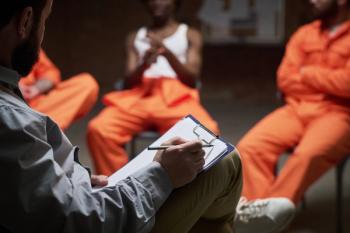
- Psychiatric Times Vol 25 No 1
- Volume 25
- Issue 1
Doctors and Torture
Following reports that psychologists and psychiatrists have been involved in interrogations in Guantanamo Bay, Cuba, and other locations, Dr. Stone calls on the professional organizations for both specialties to make it clear that torture is not condoned by the medical or psychological profession.
There is good reason to believe that psychologists and psychiatrists have been involved in the cruel interrogations that have taken place in Guantanamo Bay, Cuba, and elsewhere in the war against terrorism. Both the American Psychological Association and the American Psychiatric Association have therefore made clear that it is unethical for members of their profession--whether in the military or not--to participate in torture.
However, that ethical injunction has little force unless there is a clear definition of what constitutes physical and psychological torture. Are prolonged isolation, sexual humiliation, sleep deprivation, forced nudity, growling guard dogs, sensory deprivation and strobe lights psychological torture? And what about using coercive methods based on psychiatric evaluations that reveal the fears, concerns and anxieties of the detainee? Or having a Behavioral Science Consultation Team (biscuit team) hidden behind a one-way mirror guiding interrogators on how best to exploit the psychological vulnerabilities of the detainee they are interrogating? According to the Physicians for Human Rights, all of these measures, which they describe as "systematic psychological torture," have been used at Guantanamo Bay with the participation of psychologists, psychiatrists and other physicians. But until U.S. Secretary of State Condoleezza Rice's statement on Dec. 7, 2005, in Kiev, Ukraine, the U.S. government's position was that none of these measures alone or taken together could be defined as torture or was forbidden by U.S. law.
The now notorious U.S. Department of Justice (DOJ) Bybee memorandum prepared in 2002 for then-Counsel to the President Alberto R. Gonzales declared that acts of interrogators "may be cruel, inhumane or degrading" but still not torture. The DOJ set the bar for torture so high that almost any cruel measure interrogators and their psychological consultants could think up would be permissible under U.S. law. The Bybee memorandum's definition of the level of severe pain that had to be met for torture sounded particularly strange to physicians: pain "equivalent in intensity to the pain accompanying serious physical injury, such as organ failure, impairment of bodily function or even death." (Author emphasis added.) The lawyers at the DOJ had found this language in a federal statute that was not defining severe pain, but a life-and-death emergency situation in which health care was mandatory. Even more extreme was the Bybee definition of psychological torture requiring that the torturer had "the specific intent to cause prolonged mental harm." Under this legal interpretation, the interrogators and their consultants could escape liability by saying that none of them specifically intended to cause the prolonged mental harms that detainees have apparently suffered: Over 20 of the detainees have attempted suicide.
In January 2005, Gonzales, by then nominee for U.S. Attorney General, explained why the lines had been drawn in this way. He stated that torture was forbidden but that interrogation involving cruel, inhumane or degrading treatment was not forbidden if it took place outside the United States and U.S. citizens were not the victims--a rule that seemed tailor-made for Guantanamo Bay and the Central Intelligence Agency. This was the DOJ's interpretation of the U.N. Convention Against Torture and Other Cruel Inhumane and Degrading Treatment or Punishment, ratified by the United States in 1994.
Defenders of the Bush administration have consistently said that their critics have confused torture with cruel and inhumane treatment. But if there was confusion, it was because most Americans had no idea that their government had adopted such an appalling legal interpretation of torture and permitted everything else that took place at Guantanamo Bay. Sen. John McCain (R-Ariz.) has proposed legislation that would remedy these abuses, and in December the Army approved a new manual that protects prisoners from some of the cruel, inhumane and degrading practices that took place in Guantanamo Bay and elsewhere, but the details remain classified. Still troubling is the report that the Army guidelines are based on the Geneva Conventions, conventions that the Bush Administration say do not apply to suspected terrorists or to the detainees at Guantanamo Bay. Given the long tradition of "Do No Harm," it is difficult to imagine any health care professional saying that it would be ethical for physicians to participate in cruel, inhumane, degrading and punitive interrogations even if the U.S. Attorney General decrees that it is not a crime and that certain victims are not protected by law.
Rice seems to have joined those of us who are appalled by the Bush administration's manipulation of the law and the United States' treaty obligations. Speaking in Kiev on Dec. 7, she broke rank and said that the ban on "cruel, inhumane and degrading treatment applies ... both in the [United States] and around the world." One can only hope that Rice is articulating a new Bush administration position and that the APA and the American Psychological Association will both issue new guidelines emphasizing that it is unethical to participate in any interrogation involving torture or any other cruel, inhumane and degrading measures.
There are those who will still want to use torture in ticking bomb scenarios. Such concerns do not justify the shameful practices at Guantanamo Bay. What U.S. law and U.S. psychiatrists and psychologists need to do now is to reassert our basic norms of decent and ethical conduct, which seem to have collapsed in our response to Sept. 11.
Articles in this issue
almost 18 years ago
Does Infection Increase Risk of Psychosis and Schizophrenia?about 18 years ago
Washington Reportabout 18 years ago
Mental Problems in Returning Vets: Delayed Testing Shows Higher Ratesabout 18 years ago
Exposure to Violence Referencesabout 18 years ago
Brain Stimulation Therapies for Treatment-Resistant Depressionabout 18 years ago
Improved Functioning in Bipolar DepressionNewsletter
Receive trusted psychiatric news, expert analysis, and clinical insights — subscribe today to support your practice and your patients.







